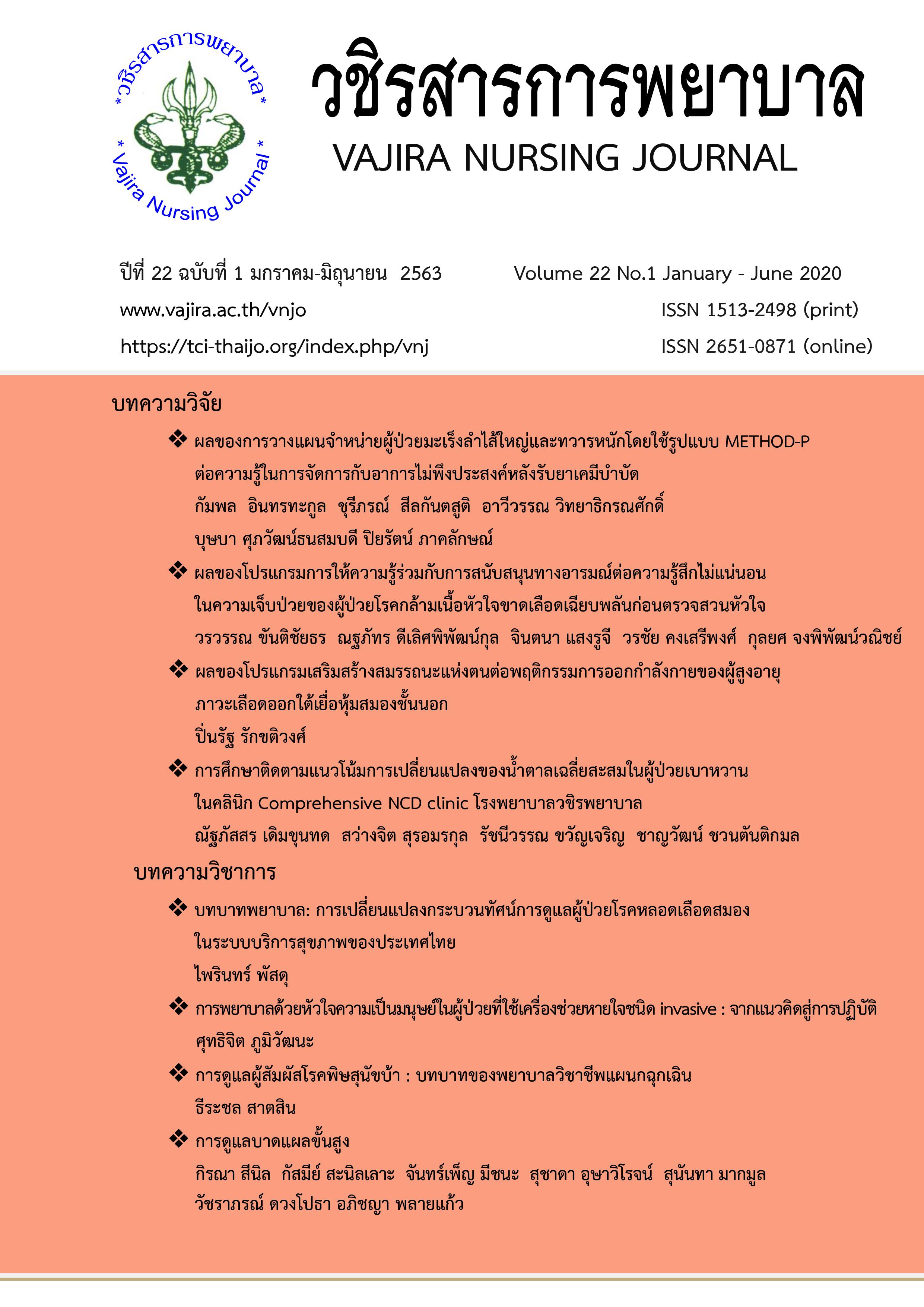ผลของโปรแกรมเสริมสร้างสมรรถนะแห่งตนต่อพฤติกรรมการออกกำลังกายของผู้สูงอายุภาวะเลือดออกใต้เยื่อหุ้มสมองชั้นนอก
Main Article Content
บทคัดย่อ
การศึกษานี้เป็นการวิจัยเชิงทดลองแบบสุ่มและมีกลุ่มควบคุม (Randomized Controlled Trial ; RCT) มีวัตถุประสงค์เพื่อศึกษาผลของโปรแกรมเสริมสร้างสมรรถนะแห่งตนต่อพฤติกรรมการออกกำลังกายของผู้สูงอายุภาวะเลือดออกใต้เยื่อหุ้มสมองชั้นนอก กลุ่มตัวอย่างคือ ผู้สูงอายุภาวะเลือดออกใต้เยื่อหุ้มสมองชั้นนอก ที่เข้ารับการรักษาที่หอผู้ป่วยประสาทศัลยศาสตร์ โรงพยาบาลศิริราช 60 คน คัดเลือกกลุ่มตัวอย่างตามเกณฑ์ที่กำหนด สุ่มเป็นกลุ่มทดลองและกลุ่มควบคุม กลุ่มละ 30 คน กลุ่มทดลองได้รับโปรแกรมเสริมสร้างสมรรถนะแห่งตน เพื่อส่งเสริมพฤติกรรมการออกกำลังกายร่วมกับการดูแลตามปกติ กลุ่มควบคุมได้รับการดูแลตามปกติ โปรแกรมฯ สร้างโดยใช้กรอบแนวคิดทฤษฎีสมรรถนะแห่งตน (Self - efficacy) ประกอบด้วยสื่อเว็บไซด์ให้ความรู้และคลิปวิดีโอนำเสนอตัวแบบผู้สูงอายุภาวะเลือดออกใต้เยื่อหุ้มสมองชั้นนอก แบบบันทึกการออกกำลังกาย แผนการติดตามเยี่ยมทางโทรศัพท์ เครื่องมือที่ใช้ในการเก็บรวบรวมข้อมูลประกอบด้วย1) แบบสอบถามข้อมูลทั่วไปและการเจ็บป่วย 2) แบบสอบถามพฤติกรรมการออกกำลังกายของผู้สูงอายุภาวะเลือดออกใต้เยื่อหุ้มสมองชั้นนอก วิเคราะห์ข้อมูลโดยเปรียบเทียบค่าเฉลี่ยคะแนนพฤติกรรมการออกกำลังกายของผู้สูงอายุระหว่างกลุ่มทดลองและกลุ่มควบคุม ใช้สถิติ ANCOVA โดยควบคุมคะแนนพฤติกรรมก่อนทดลอง
ผลการศึกษา พบว่า หลังการทดลองผู้สูงอายุภาวะเลือดออกใต้เยื่อหุ้มสมองชั้นนอกที่ได้รับโปรแกรมเสริมสร้างสมรรถนะแห่งตนมีพฤติกรรมการออกกำลังกายมากกว่ากลุ่มที่ได้รับการดูแลตามปกติ อย่างมีนัยสำคัญทางสถิติ (p<.05)
ข้อเสนอแนะ พยาบาลควรนำโปรแกรมเสริมสร้างสมรรถนะแห่งตนไปประยุกต์ใช้กับผู้ป่วยสูงอายุภาวะเลือดออกใต้เยื่อหุ้มสมองชั้นนอก
Article Details
เนื้อหาและข้อมูลในบทความที่ลงตีพิมพ์ในวชิรสารการพยาบาลถือเป็นข้อคิดเห็นและความรับผิดชอบของผู้เขียนบทความโดยตรง ซึ่งกองบรรณาธิการไม่จำเป็นต้องเห็นด้วย หรือร่วมรับผิดชอบใด ๆ ทั้งสิ้น
บทความ ข้อมูล เนื้อหา รูปภาพ ฯลฯ ที่ได้รับการตีพิมพ์ในวชิรสารการพยาบาล ถือเป็นลิขสิทธิ์ของวชิรสารการพยาบาล หากบุคคลใดหรือหน่วยงานใดต้องการนำทั้งหมดหรือส่วนหนึ่งส่วนใดไปเผยแพร่ต่อหรือเพื่อกระทำการใด ๆ จะต้องได้รับอนุญาตเป็นลายลักอักษรจากวชิรสารการพยาบาลก่อนเท่านั้น
เอกสารอ้างอิง
มูลนิธิสถาบันวิจัยและพัฒนาผู้สูงอายุไทย. สถานการณ์ผู้สูงอายุไทย พ.ศ.2558. [รายงานประจำปี]. สืบค้นเมื่อ 18 ต.ค.2560 จาก http://thaitgri.org/?p=37841
ธนา นิลชัยโกวิทย์ จักรกฤษณ์ สุขยิ่ง ชัชวาล ศิลปกิจ. (2539). ความเชื่อถือได้และความแม่นตรงของ General Health Questionnaire ฉบับภาษาไทย. วารสารสมาคมจิตแพทย์แห่งประเทศไทย. 41(1) : 2 – 17.
พรธิพา ธิมายอม. (2555). ผลของการใช้โปรแกรมพัฒนาการรับรู้ความสามารถของตนที่มีต่อพฤติกรรมสุขภาพของผู้รับบริการอัมพาตครึ่งซีกจากโรคหลอดเลือดสมอง. วารสารพยาบาลสาธารณสุข, 28(2), 33-45.
วิศาล คันธารัตนกุล. (2550). สรีรวิทยาการออกกำลังกาย ใน วิศาล คันธารัตนกุล และภาริส วงศ์แพทย์ (บรรณาธิการ). คู่มือเวชศาสตร์ฟื้นฟู (พิมพ์ครั้งที่ 4). กรุงเทพฯ: โฮลิชซิ่งพับลิ่ง.
Allison, M. J., & Keller, C. (2014). Self-Efficacy intervention effect on physical activity in older adults. Western Journal of Nursing Research, 32(8), 31-46.
Bandura, A. (1997). Self-efficacy : The exercise of control. New York: W. H. Freeman and Company.
Edwards MD, et al. (2014) Interactions between chromosomal and nonchromosomal elements reveal missing heritability. Proc Natl Acad Sci U S A 111(21):7719-22
Glen, M., & Gardner, K. I. (2015). Effectiveness of short-term aerobic exercise program on cardiovascular risk profile in moderate risk adults: a randomized controlled pilot study. Journal of Health and Research, 2(1), 38-45.


